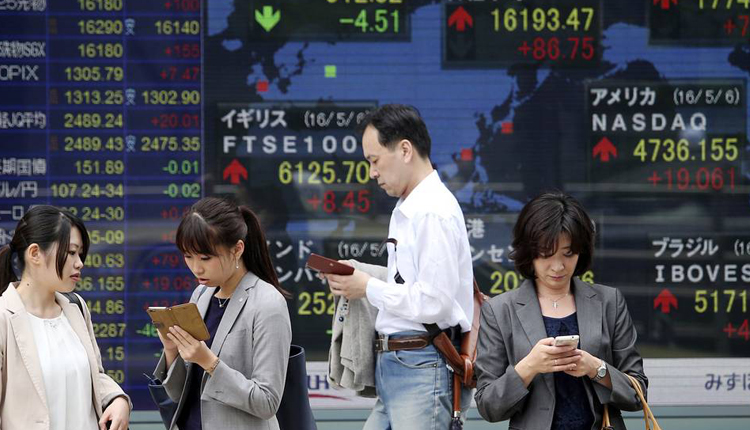Asian stocks closed mixed early on Friday, with investors cautious over trade tensions after the United States announced tariffs on steel and aluminum imports from several of its allies would be reapplied.
The Nikkei 225 edged down by 0.14 percent, or 30.47 points, to 22,171.35 and the broader Topix rose 0.1 percent. Automakers were among the best-performing sectors, with gains also seen in materials and banks.
Over in South Korea, the Kospi rose 0.66 percent to close at 2,438.96, outperforming its regional peers.
Australia’s S&P/ASX 200 shed 0.36 percent to close at 5,990.40 but was off its session low, with the energy and financial sectors contributing to the overall decline.
Elsewhere, Hong Kong’s Hang Seng Index tacked on 0.12 percent by 3:27 p.m. HK/SIN amid gains in developers and energy stocks.
On the mainland, stocks finished the session lower as China A shares made their long-awaited debut on MSCI’s Emerging Markets Index. The Shanghai composite declined 0.65 percent to close at 3,075.46 and the Shenzhen composite fell 1.2 percent to 1,746.33. Benchmarks in Hong Kong and on the mainland had gained more than one percent in the last session.
MSCI’s broad index of shares in Asia Pacific excluding Japan edged up by 0.28 percent in Asia afternoon trade.
Trade concerns returned to the fore after the Trump administration said tariffs on steel and aluminum imports from Canada, Mexico and the European Union would take effect Thursday midnight U.S. time. The countries had previously been exempted from those tariffs, originally announced in March.
Canada plans to impose dollar-for-dollar tariffs on the U.S. in retaliation, according to the country’s foreign minister. The EU, another U.S. ally, said it would introduce countermeasures.
“It’s looking like trade protectionism is clearly escalating. It looks like the NAFTA deal that we thought could go through hasn’t and now these steel and aluminum tariffs … There’s a lot of things and I think the markets are starting to get concerned,” Rob Subbaraman, head of emerging markets economics at Nomura, told CNBC’s “Squawk Box.”
U.S. stocks closed lower amid concerns the moves could lead to a trade war: The Dow Jones industrial average declined 1.02 percent, or 251.94 points, to close at 24,415.84.
Still, major U.S. stock indexes finished the month with gains, with the Dow up 1.05 percent for the month. The Nasdaq composite rose 5.32 percent in May.
Elsewhere, political turmoil in Italy that had spooked global markets this week took a back seat after anti-establishment parties in the country came to a consensus on forming a coalition government.
The dollar index, which tracks the greenback against a basket of currencies, was steady at 94.061 at 3:30 p.m. HK/SIN. Against the yen, the dollar was slightly firmer at 109.16.
Meanwhile, Brent crude futures added 0.09 percent to trade at $77.63 per barrel. U.S. West Texas Intermediate crude futures tacked on 0.03 percent to trade at $67.06 after settling 1.72 percent lower in the last session. U.S. crude fell 2.23 percent in May, breaking a two-month win streak.
Ahead, investors awaited the release of May nonfarm payrolls during U.S. hours as markets consider how many times the Federal Reserve will raise rates this year.
Source: CNBC


